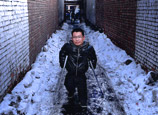
BEIJING, March 7 (Xinhua) -- It is said that women hold up half the sky. For Huang Libi in southwest China, she is holding up more than her share.
With her husband away most of the year working in a city, the 48-year-old village woman takes care of her elderly mother- and father-in-law and two children, feeds nearly 100 chickens, grows more than 200 grapefruit trees, and cultivates around 2,000 square meters of cornfield and paddy fields.
"Day after day, I get up before dawn," said Huang from Longtan village in the township of Hexing in Chongqing Municipality.
During 28 years of marriage, Huang's husband returns from southeastern Fujian Province during the Spring Festival, or the Chinese Lunar New Year.
"This is all for better earnings and a brighter future for our children," Huang said.
She is not the only woman in the village that lives apart from her husband. More than 75 percent of male Longtan villagers have left for coastal cities, leaving more than 300 women behind.
Since the 1980s, rapid urbanization has led to a large number of married men in rural areas leave their homes for better payed jobs in cities.
As a result, couples are forced to live apart, with wives staying in the countryside toiling to keep their homes running.
China now has nearly 50 million left-behind women in rural areas, statistics from the All-China Women's Federation (ACWF) show.
According to research conducted by the China Agricultural University, left-behind women have taken up more than 85 percent of both farm work and household chores.
But their physical and psychological well-being is being overlooked.
Farmland, for women, has become a "second battlefield" in addition to housekeeping.
For Huang, the harvest season has become "the season of affliction."
In November, when the grapefruit is ripe, the 1.5-meter tall woman has to climb up and down trees, and carry as much as 3,500 kilograms of grapefruits to the purchaser's truck.

















 Shanghai Disney Resort unveils resort concept
Shanghai Disney Resort unveils resort concept


![]()
